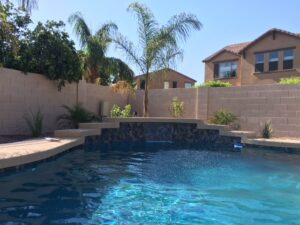
When any homeowner makes the decision to build a new swimming pool in their backyard, there’s one term that will become all too familiar: pH. Although it is sometimes assumed that you’ll need a Master’s Degree in Chemistry to understand the basics about pH, the reality is that pH is very easy to explain – and understanding why maintaining appropriate pH balance is vital is even easier – especially in a hot climate like Phoenix.
Let’s start with the basics and explain: “What exactly is pH?”
We need to thank Danish biochemist Soren Peter Lauritz Sorensen for the discovery of pH in 1909 and for cleverly coming up with an abbreviation that impacts our daily lives. The lower case ‘p’ in pH is an abbreviation for the word ‘power’ – while the capital ‘H’ is the chemical abbreviation of Hydrogen. When put together, pH is the power of Hydrogen or in regards to water, the measurement of its complete alkalinity/acidity balance.
The water’s pH balance is measured on a scale from zero (which would be a very high concentration of acid in the water) to 14 (which is the inverse, an extreme level of alkaline or ‘base’). A pH balance of 7 is regarded as being an equal blend of acid and base. However, it’s important to understand that although a measurement of 7 is equal, it may not be the perfect measurement for your pool.
How does pH balance impact my Phoenix pool?
Once pool construction is complete, your pool company will explain the importance of routine service and maintenance. One of the most important weekly tests is measuring your water’s pH balance. Water that is either too acidic or too alkaline will cause potentially dangerous chemical reactions. For example; if water is too acidic, (or the pH balance is closer to ZERO on the 0 to 14 scale) the water can corrode metal and/or cause skin irritation. If the water’s pH is too alkaline it can cause damage to plumbing equipment and the pool surface, and also make the water cloudy.
It’s also important to realize how pH impacts your pools ability to maintain a healthy chlorine level. Chlorine is critical for destroying bacteria and pathogens that can be harmful to our bodies. If the water is too alkaline in nature, the chlorine won’t be effective in destroying those pathogens. Conversely, if the water is too acidic, the chlorine will dissipate rapidly – and not have a chance to kill the bacteria. Having the correct pH balance is a continuous process due to the fact that the introduction of any element to the water, (such as oils from our bodies, dirt, leaves or any debris that falls into the water) can and will change the pH balance.
What is a good pH Balance for my Phoenix pool?
Pool experts agree that maintaining a pH balance from 7.2 (on the low side) to 7.8 (on the high side) is a good range – especially when living in a hot weather state like Arizona. The sun can impact waters pH balance through evaporation, which is one reason why pool service companies regularly check the water level of a swimming pool and add water, when needed.
In order to increase the pH balance or reduce it, pool experts will use certain pool acids or bases that are designed specifically for your type of swimming pool. The materials used to maintain a saltwater pool are much different than a fresh water pool.
One other thing to keep in mind is that calcium tends to scale on tile, rock work and interior finishes when pH climbs above 7.5. So, if your pH is on the higher end of the safe spectrum, you will most likely find yourself cleaning more often.
Endorsed by Ron Wolfley
Former Arizona Cardinals Player and Arizona Sports 98.7 FM Host



